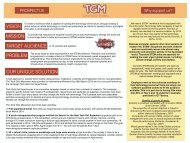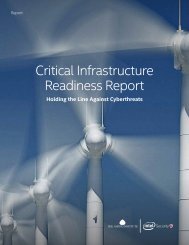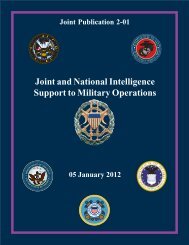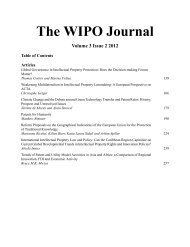Transparency Initiative (EITI)
2eoch1l
2eoch1l
You also want an ePaper? Increase the reach of your titles
YUMPU automatically turns print PDFs into web optimized ePapers that Google loves.
70 Case Study: Democratic Republic of the Congo (DRC)<br />
8.3.3 ANTI-CORRUPTION<br />
8.3.4 TRADE AND INVESTMENT CLIMATE<br />
Many interviewees questioned the <strong>EITI</strong>’S legitimacy because<br />
it has not brought significant, if any, real change on<br />
the ground, particularly to those communities around operations.<br />
However, a significant number of administrative<br />
changes have taken place which point to an upward trajectory,<br />
saving significant cost and time as well as building the<br />
capacity of the regulatory agencies which are crucial to a<br />
well-run sector.<br />
Tax Identification Numbers: For the first time in modern<br />
DRC history, there is one tax identification number for<br />
each company, which allows for significant coordination<br />
across ministries. As one interviewee relayed, “Now we understand<br />
how much we are receiving. Some contracts are<br />
very one-sided, towards the companies. Now we hope that<br />
we can hold a debate potentially changing some of those<br />
contracts, so that the government’s take is more.” While it is<br />
unclear if the <strong>EITI</strong> process can take full credit for tax identification<br />
numbers (the IMF advocated heavily for their introduction),<br />
it is part of the general improvement in the<br />
sector.<br />
Coordination: The MSG meetings bring together up to five<br />
ministers together to discuss policy. Some CSOs questioned<br />
their motivation for being there, however, their presence<br />
ensures that the <strong>EITI</strong> process receives significant attention<br />
and that coordination between them takes place. Each MSG<br />
member reportedly receives USD 500 per MSG meeting just<br />
for their participation. The existence of an inter-ministerial<br />
informal network was noted, which helped the exchange<br />
of information and to assist with the creation of key focal<br />
points for required information.<br />
Capacity: The Inspecteur General des Finances (Auditor<br />
General) has played an important role, recapturing its former<br />
role as the main regulatory body in public finance and<br />
building on it. A number of interviewees mentioned the<br />
much-strengthened IGF and its role as a harbinger of sustained<br />
change and that it is becoming an institution “with<br />
teeth”, according to one interviewee. As capacity is built and<br />
confidence grows, public sector culture is positively changing,<br />
moving towards transparency.<br />
The impact in the country’s trade and investment climate<br />
is for the moment unclear and it is premature to state that<br />
the <strong>EITI</strong> has had a positive quantifiable impact in attracting<br />
foreign investment. The <strong>EITI</strong> is geared to attract the “right<br />
kinds of investors” – those wanting a long-term sustainable<br />
relationship, willing to pay a premium for a more transparent<br />
environment in investing significantly in the country’s<br />
natural resources, and expect a sufficient reward for<br />
taking that risk.<br />
It is unclear how much the DRC government wants to capitalize<br />
on its <strong>EITI</strong> involvement and increased transparency,<br />
to use it as a differentiator to attract further investment.<br />
At a 2015 South African Mining Conference, an audience<br />
member remarked that the <strong>EITI</strong> was not mentioned at all in<br />
the DRC’s speech. Reports or brochures were not available<br />
at the government’s exhibition stand. As trade and investment<br />
climate usually improves with transparency, it was<br />
perceived as a surprise that DRC’s promotion did not mention<br />
the <strong>EITI</strong>. The view of the officials responsible could<br />
be described that because of the geological resources the<br />
country will remain on a certain level of interest to investors<br />
for the next several decades with or without <strong>EITI</strong>.<br />
As mentioned above, Moody’s gave a B3 credit rating to<br />
DRC in 2013, six steps below investment grade. In the section<br />
“Very Weak Institutional Strength”, Moody’s stated,<br />
“The authorities have also embarked on a series of reforms<br />
to enhance transparency and improve the business climate,<br />
including the DRC's commitments to both the Extractive<br />
Industries <strong>Transparency</strong> <strong>Initiative</strong>….” (Moody’s 2013). That<br />
rating remains unchanged.<br />
During both missions, the consultant spoke with the lone<br />
Senator who is working in the <strong>EITI</strong> process. He was enthusiastic<br />
that the 2015 Report could bring about change, as it<br />
would be the first time that the <strong>EITI</strong> Report would inform<br />
the budgetary process. He was also keen that an array of<br />
laws and procedures be introduced to harness the process<br />
into the country’s laws. It was too early to understand if this<br />
was achievable with an, up to now, weak engagement strategy<br />
within the Parliament. If a structured and focused approach<br />
to the country’s lawmakers is undertaken, the necessary<br />
reforms could be introduced, bringing about the<br />
necessary impact in DRC’S institutions and legal processes.









